Salmon Heroes is a three-part, five-hour program designed to teach students about salmon habitat needs and how stormwater pollution is affecting the watershed. It occurs in fall and winter when salmon return to their spawning grounds here in the Pacific Northwest, and allows students to see salmon in their habitat as well as learn how to help them through community science and stewardship actions.
Recommended for grades 4th-8th
Season: September – December
Registration for Salmon Heroes 2024 will open in August
We at the Environmental Science Center are excited to move forward with an in-person Salmon Heroes season and to offer our signature hands-on outdoor lessons. We will also continue to offer virtual options for field trips as needed. All of our employees are fully vaccinated against COVID-19.
The Salmon Heroes Program includes a one-hour introductory lesson, a three-hour field study investigation, and our one-hour post-field study synthesis lesson. If you are interested, our funding also allows us to offer an additional post-field study lesson focused on stewardship, in which we go into more depth with students to design schoolyard projects related to salmon and watersheds. Learn more about the Salmon Heroes program by watching students and naturalists work!
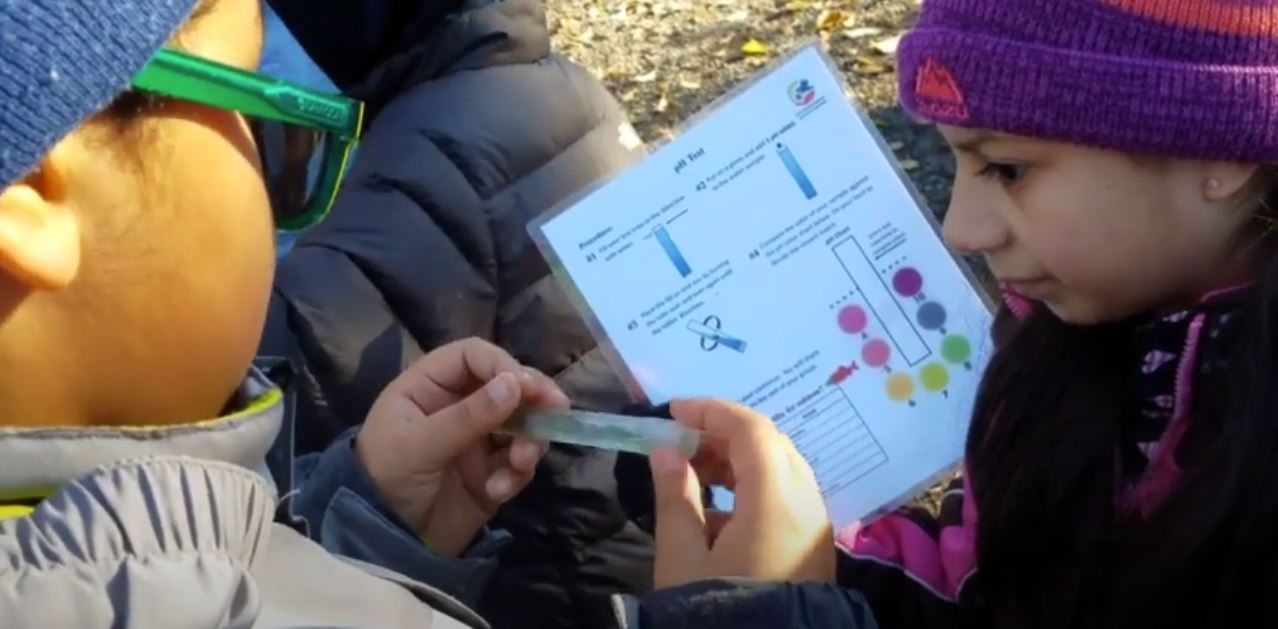
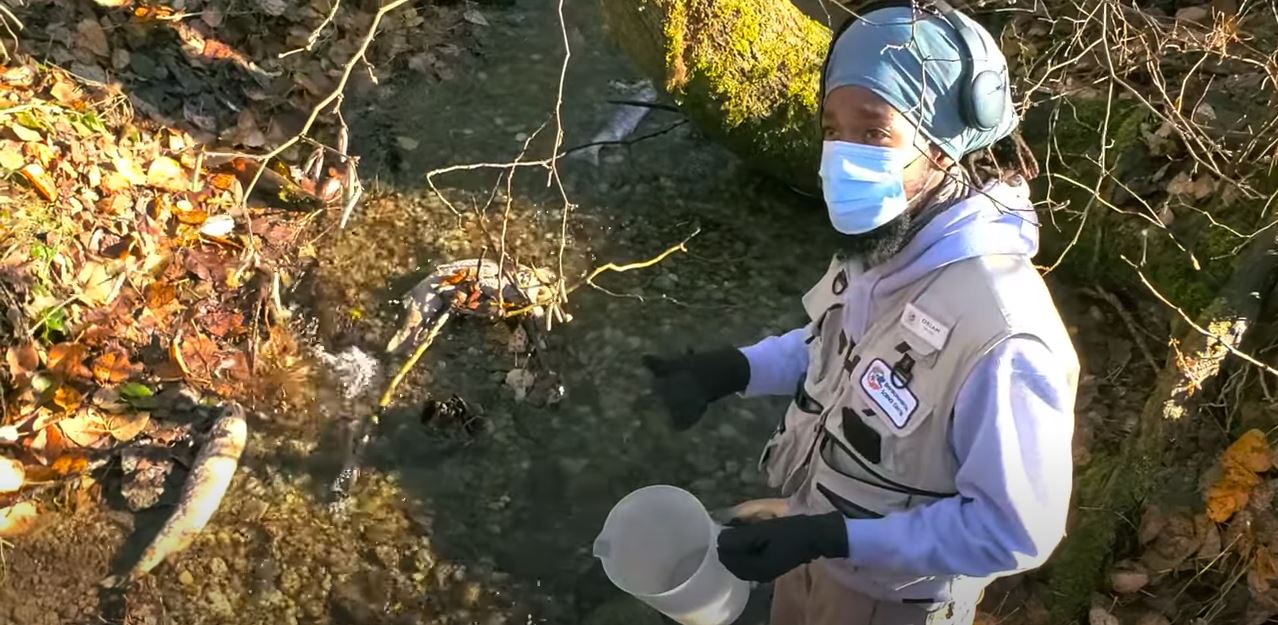
If you have questions, please contact our Programs Manager: Rosie@environmentalsciencecenter.org
In-Person or Virtual Options:
All aspects of our program will be available as both a live class where our educators come to your school, or as a virtual lesson taught over Zoom or Microsoft Teams. We also have pre-recorded versions (in both English and Spanish) of all aspects of our program if needed. In addition, ESC staff have created a Salmon Heroes Field Journal to help guide students through all the parts of the program (printed booklets will be brought to your school during or before your first lesson); the journal is available in both English and Spanish. Teachers can also request digital versions of journal (PDF or Google Slides).
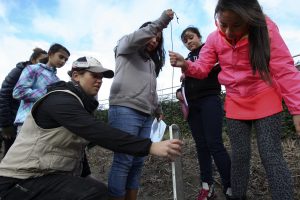
-
- Part 1: During the initial one-hour introductory lesson, students will delve into the habitat needs of salmon, as well as the challenges to survival that salmon face during each stage of their life cycle. This lesson covers limiting factors for salmon survival, including the impacts from human development, climate change, and polluted stormwater.
- Part 2: This is the field trip component and will occur at whichever of our field sites are located within your district. Students will review the salmon life cycle, learn external and internal anatomy, collect water quality data, use maps to examine whole watershed connections, and play salmon-related games!
- Part 3: The one-hour synthesis lesson will discuss the water quality data students collected during the field trip. Students will also be tasked with discussing solutions to many common pollutants in the watershed, such as carbon dioxide, tire dust, fertilizer, dog waste, and car oil. They will have the opportunity to brainstorm positive actions they can take in their community and with their families to improve local water quality. This lesson includes creating models of polluted stormwater and a natural filter.
- Optional Stewardship Extension – Part 4: ESC naturalists will work with students to develop stewardship action projects related to their learnings about how humans affect watershed health. These might be public service announcements (PSAs) created about stormwater pollution, or crafting a letter to the city council about salmon health in their community. We can also work with classes who might be interested in organizing in-person projects such as a trash pick-up on school grounds, removing invasive plants, or stenciling the storm drains on your school property. Projects can be individual, in small groups, or can be a single project for the entire class.
All components of Salmon Heroes are correlated with Next Generation Science Standards.

Locations:
Parts 1 and 3 take place in each school’s classroom. For Part 2, the field trip, we want to connect students with waterways in their communities. We typically bring students to Miller & Walker Creeks in Normandy Park (Highline and Tukwila School Districts), the Cedar River in Renton (Renton and Kent School Districts), and Mary Olson Creek in Auburn (Auburn, Fife, and Federal Way School Districts).
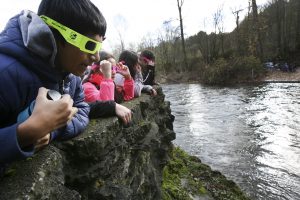
Cost:
Thanks to our funders, we are able to offer the Salmon Heroes program at no cost to students and teachers at schools where more than 45% of families qualify for free or reduced-price meals. For schools where less than 45% of families qualify, we charge $50 per class for the program. For schools that come on an in-person field trip, we have transportation subsidies (up to $150 per 1-2 classes or up to $300 per 3-4 classes) for those schools where more than 45% of students qualify for free or reduced-price meals.
To book Salmon Heroes:
Our online Salmon Heroes Registration Forms will allow you to select dates that work best for your students for each component. Because salmon return to each of our sites at different times throughout the fall, we designate different dates (and different registration links) for different school districts in order to maximize salmon viewing. Please register for each of the three components separately, using the links for the district you’re in. If you are in a district not listed, please contact Rosie (rosie@environmentalsciencecenter.org) to see what field site will work best for you.
We schedule by grade cohort. Please coordinate with the other teachers of your grade at your school, and sign up as a group. One teacher should sign up all the classes of their grade at their school. If you are interested in registering your students for the optional Stewardship Action Project Lesson, please include that information in your registration form.
Registration Links for Renton & Kent School Districts:
- Part 1: Introductory Lesson (Renton & Kent)
- Part 2: Field Lesson (Renton & Kent)
- Part 3: Synthesis Lesson (Renton & Kent)
Registration Links for Highline & Tukwila School Districts:
- Part 1: Introductory Lesson (Highline & Tukwila)
- Part 2: Field Lesson (Highline & Tukwila)
- Part 3: Synthesis Lesson (Highline & Tukwila)
Registration Links for Auburn, Fife, Federal Way School Districts:
- Part 1: Introductory Lesson (Auburn, Fife, Federal Way)
- Part 2: Field Lesson (Auburn, Fife, Federal Way)
- Part 3: Synthesis Lesson (Auburn, Fife, Federal Way)
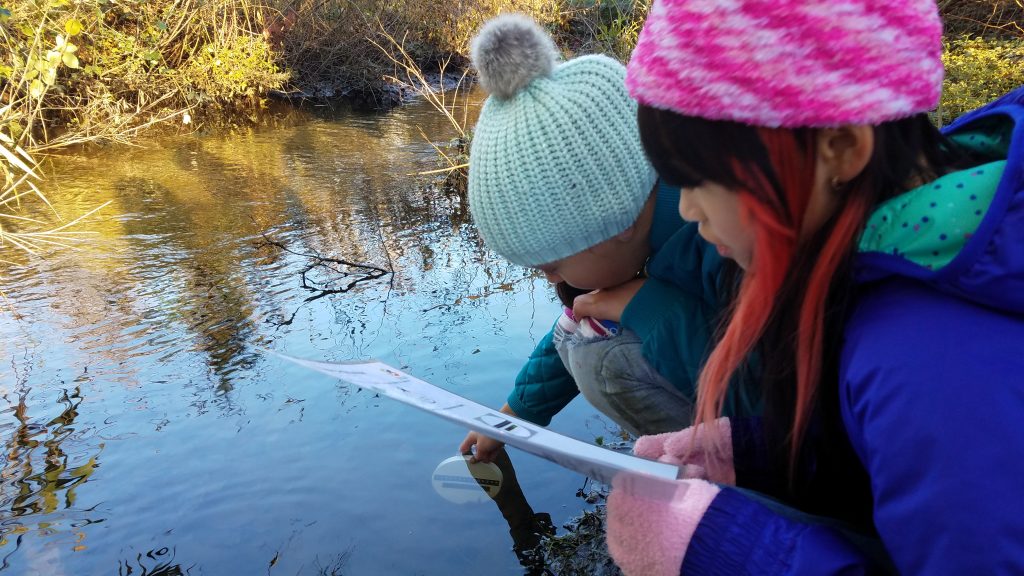
After participating in ESC’s Salmon Heroes program, students pledge to adopt three behaviors to protect, to conserve, and to educate others about the importance of clean watersheds to sustain healthy salmon. To honor these students’ commitment to environmental stewardship, they received an Official Salmon Hero identification card.
Past Salmon Heroes can be found here!
